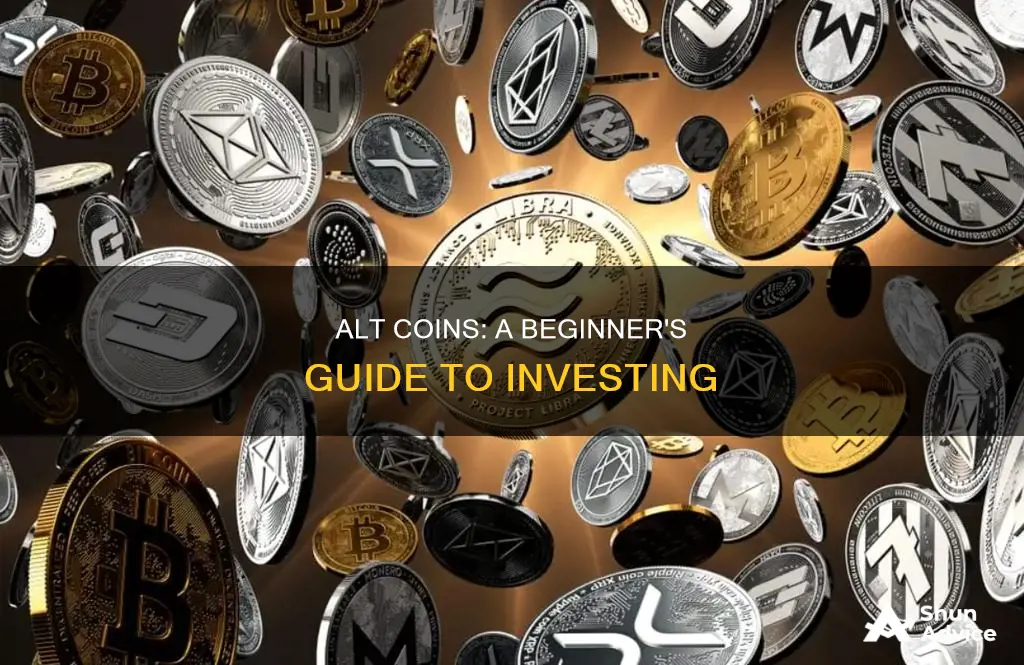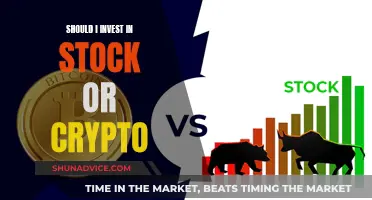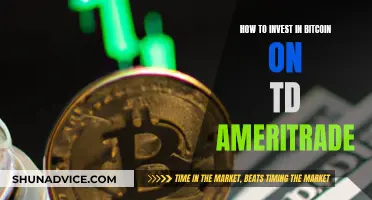
Altcoins are alternative cryptocurrencies to Bitcoin, often presenting themselves as better options than the premier cryptocurrency. They are incredibly risky investments, with a high chance of losing money. However, they can also offer high-growth potential and diversification. Before investing in altcoins, it is crucial to conduct thorough research, assess the risks, plan for diversification, set a budget, and choose a reliable cryptocurrency exchange. While altcoins present significant risks, careful research and due diligence can help identify worthwhile investment opportunities.
| Characteristics | Values |
|---|---|
| Altcoin Definition | Any cryptocurrency that isn't Bitcoin (BTC) |
| Market Share | Altcoins make up nearly 40% of the total cryptocurrency market |
| Risk | Altcoins are incredibly risky investments |
| Upside | Altcoins have a much higher upside in terms of percentage gain |
| Research | Research the team, use cases, road map, and technology used before investing |
| Diversification | Diversify your crypto portfolio by spreading your investment across various altcoins |
| Budget | Risk the amount you can afford to lose |
| Exchange | Choose a reliable cryptocurrency exchange with a good track record, strong security measures, and a user-friendly interface |
What You'll Learn

The pros and cons of investing in altcoins
Altcoins are any cryptocurrencies that are not Bitcoin, and sometimes not including Ethereum either. They are alternatives to Bitcoin and traditional fiat money.
There are thousands of altcoins on the market, and they can be categorised in several ways, including stablecoins, mining-based coins, staking-based coins, and governance tokens.
Pros of Investing in Altcoins:
- They can improve upon the perceived limitations of Bitcoin, such as transaction speeds or energy efficiency.
- They offer high potential rewards.
- There is a large selection of altcoins, all with their own unique purposes and competitive advantages.
Cons of Investing in Altcoins:
- They are incredibly risky investments.
- They have a smaller investment market compared to Bitcoin.
- It is difficult to determine use cases for many altcoins.
- Many altcoins are scams or have lost developer and community interest.
- They are less liquid than Bitcoin.
- They are harder to buy as they are often only available on certain altcoin exchanges.
Altcoins are riskier investments than Bitcoin, but they can also offer higher potential rewards. It is important to do your research and understand the risks before investing in altcoins.
Small Bitcoin Investments: Worth the Risk?
You may want to see also

How to research altcoins before investing
Start with a Clean Slate
Forget any "hot tips" or preconceived ideas you may have about a given coin. Put aside any emotional attachment to a particular investment and focus on conducting an objective analysis.
Begin with the Fundamentals
Analyse the coin's total supply and circulating supply. Understand the relationship between supply and price, and consider the potential for growth.
Evaluate the coin's intended use case. Read the team's white paper to assess whether the coin addresses a significant problem or fills a need in a specific industry. Consider the size and strength of the industry and the coin's potential for adoption.
Understand Supply and Demand
Look for altcoins with incentives that encourage demand to rise while supply remains stable or decreases. This dynamic can lead to price increases due to the fundamental law of supply and demand.
Examine the Team and Stakeholders
Scrutinize the team behind the project. Review their website, LinkedIn profiles, and other sources to assess their qualifications, experience, and involvement in the crypto community and blockchain ecosystem. Evaluate their track record, including their success rate with previous projects.
Evaluate the White Paper
Scrutinize the token's white paper to understand its use cases, aims, and team vision. Ensure the altcoin's white paper clearly articulates how it will benefit its users and provides a compelling value proposition.
Assess the Exchange Availability
Consider the accessibility of the altcoin. Is it available on reputable and trustworthy exchanges like Binance, Bittrex, and Kucoin, or do you need to use smaller, less established exchanges? The availability on major exchanges can impact the ease of acquisition and future value.
Analyse Marketing and Branding
Evaluate the marketing and branding strategies of the altcoin. Assess the quality of the project's website, the attractiveness of its logo, and the effectiveness of its marketing campaigns. A strong marketing strategy, a well-chosen name, and a compelling logo can contribute to the project's success.
Due Diligence and Red Flags
Conduct thorough due diligence to avoid potential scams or poorly managed projects. Research the team's identities, track record, and professionalism. Be cautious of projects with excessive pre-mining, token distribution issues, censorship of community discussions, or plagiarism of content, design, or codebases.
Seek Multiple Sources of Information
Don't rely solely on the project's website and marketing materials. Utilize forums, social media, and expert opinions to gather a well-rounded understanding of the altcoin. Follow crypto influencers, participate in crypto chats and forums, and consult with experienced individuals or groups in the crypto space.
Bitcoin's Long-Term Investment Potential: Is It Worthwhile?
You may want to see also

The risks of investing in altcoins
Altcoins are any cryptocurrency that is not Bitcoin, and sometimes not Ethereum. They are alternatives to Bitcoin and traditional fiat money.
There are several types of altcoins, including stablecoins, mining-based coins, staking-based coins, and governance tokens. They are generally riskier investments than Bitcoin, and it is difficult to tell which are legitimate.
Scams and Failure
Many altcoins are scams or end up failing. This is because the altcoin market is less established and more volatile than the market for larger cryptocurrencies like Bitcoin. There are thousands of altcoins, and it is challenging to pick out the best ones to invest in. Due to the high level of risk, it is important to only invest money you can afford to lose.
Illiquidity
Altcoins have a smaller investment market compared to Bitcoin. The altcoin market is characterised by fewer investors and less activity, resulting in thin liquidity. This makes it more difficult to buy and sell altcoins, and there is a higher risk of losing money.
Regulatory Risk
Many altcoins are unregulated and not subject to the same protections as securities offered on regulated exchanges. This means that investors may have less recourse in the event of fraud or other issues. The decentralised and anonymous nature of altcoins can also make it difficult to know where your money is going or who is behind the coin.
Volatility
The value of altcoins can be extremely volatile, and they are subject to sudden surges and crashes in popularity. This makes it difficult to time trades and increases the risk of losing money.
Difficulty of Understanding
It can be challenging to distinguish between different altcoins and their respective use cases, making investment decisions complicated and confusing. The lack of understanding can lead to poor investment choices and financial losses.
Limited Protections
When investing in a security on a regulated exchange, investors have protections in place, such as insurance. However, these protections may not be available when investing in altcoins. Even when altcoins fall under the jurisdiction of regulatory bodies like the SEC, they can still pose a significant risk of fraud.
The Ultimate Guide to Investing in Bitcoin
You may want to see also

How to buy altcoins
There are thousands of altcoins available for investors, ranging from stablecoins to meme coins. Stablecoins are cryptocurrencies with a value that remains "pegged" to another asset, while meme coins, like Dogecoin, have gained popularity through internet hype and social media buzz.
Step 1: Determine the percentage of your crypto portfolio dedicated to altcoins
It is important to recognise that altcoins are risky investments, with 92% of blockchain projects failing and having an average lifespan of 1.22 years. Therefore, it is recommended to divide your portfolio into risk layers, especially if you intend to speculate on uncommon or untried coins.
Step 2: Research and find the best altcoin for you
There are many factors to consider when looking to purchase an altcoin. Do you want a reputable name? Should it be exclusively a cryptocurrency or can it live on a platform? This list is endless, so look through the top altcoins, read up on different altcoin traits that appeal to you, and select a crypto that suits your needs and preferences.
Step 3: Fiat money to digital money (or buy BTC)
Most altcoins cannot be purchased with USD, so you will likely need to purchase Bitcoins and swap those for your preferred altcoin on the right exchange. Some exchanges let you buy BTC with a credit card directly, which is an easy way to get started.
Step 4: Choose an exchange
After purchasing BTC, you will need to find an exchange that offers your desired altcoin. Popular exchanges include Coinbase, Binance, Kraken, and Crypto.com. When selecting an exchange, consider factors such as security, fees, and the range of cryptos available.
Step 5: Find the currency pair
After registering with your chosen exchange, you will need to move your BTC to the platform. Remember that you are trading in currency pairs, so the BTC will be exchanged for your chosen altcoin. Look at how the currency pair has traded over the past week or month to identify an optimal time to make the trade.
Step 6: Trade BTC for your chosen altcoin
When you are ready to make the trade, go to the exchange and place an order for your altcoin. Take some time to understand how orders work if this is your first time using an exchange.
Step 7: Move the altcoins into a wallet
After purchasing your altcoins, you can choose to move them off the exchange and into a crypto wallet. Crypto wallets are available as hot wallets (connected to the internet) or cold wallets (hardware wallets that are not connected to the internet).
Step 8: Dream of Lambos
Congratulations! You have successfully speculated on the future of money. Hopefully, your digital asset appreciates, and you become fantastically rich.
Remember to always conduct thorough research and only invest what you are willing to lose, as the cryptocurrency market is highly volatile and risky.
Dogecoin Investment: Worthwhile or Risky Move?
You may want to see also

Altcoins with 100x potential
According to crypto trader and influencer Lark Davis, there are several ways to find altcoins with the potential to give investors 100x gains. Here are some tips to identify these crypto assets:
Market Capitalization
Look for altcoins with a relatively low market capitalization, ideally under $10 million. These coins tend to offer the most significant financial opportunities as they have the potential to surge in value. You can use crypto data comparison websites like CoinGecko to filter and identify coins with low market capitalizations.
Token Sales
Keep an eye on token sales, as there have been cases of tokens surging over 100x on their first day of listing. However, be aware that most new launches happen on platforms that require investors to hold specific tokens, which may cost thousands of dollars. Platforms like Polkastarter and Binance Launchpad are examples of such launchpads. Alternatively, look for promotional offerings and token sales on more equitable platforms like Balancer (BAL).
Decentralized Finance (DeFi) and Non-Fungible Tokens (NFTs)
Think beyond the crowded trade of DeFi and NFTs. Consider other use cases for cryptocurrency, such as enterprise use cases or decentralized cloud computing. Explore the total value locked (TVL) of DeFi platforms, as platforms with a TVL below their market capitalization may indicate that the crypto asset is undervalued.
Research and Venture Capitalist Backing
Conduct thorough research before investing. Evaluate if the token's use case makes sense and if the project has a solid revenue model. Additionally, check if prominent venture capitalists are backing the project. Remember that investing in cryptocurrencies involves high levels of risk due to market volatility, so caution and due diligence are essential.
Some altcoins that have shown potential in the past include Ethereum (ETH), Cardano (ADA), Binance Coin (BNB), Uniswap's UNI, and Dogecoin (DOGE). These coins have experienced significant price hikes and surges in their respective markets.
Laundromat Investment: Worth Your Money?
You may want to see also
Frequently asked questions
Alt coins are alternatives to Bitcoin and make up nearly 40% of the total cryptocurrency market. Alt coins are generally more volatile and speculative than Bitcoin.
Alt coins are considered riskier investments than Bitcoin due to their high volatility and speculative nature. There is also a greater risk of fraud and scams in the alt coin market, as it is less regulated.
It is important to conduct thorough research and due diligence before investing in alt coins. Investors should understand the technology, use cases, road map, team, and potential risks associated with a particular alt coin. Diversifying investments across different alt coins can also help to minimize risk.







